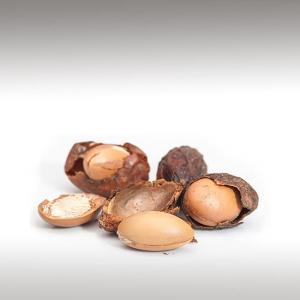
ARGAN OIL (ARGANIA SPINOSA) - BASE OILS

BASE / GENERAL DATA
Information submited: March 11, 2014 Modified: February 10, 2024 By: OperaDreamhouse
Argan oil is a plant oil produced from the kernels of the Argan tree (Argania Spinosa) that is endemic to Morocco. The tree is extremely well adapted to drought and other environmentally harsh conditions of southwestern Morocco. The genus Argania once covered North Africa and is now endangered and under protection of UNESCO.
The Argan tree provides food, shelter and protection from desertification.
The fruits of the Argan tree are nut-sizes and may be round, oval or conical in shape. The fruits are covered by a thick peel which covers the fleshy pulp. The pulp surrounds a hard-shelled nut which represents approximately 25% of the weight of the fresh fruit.
Contained within the nut are one to three Argan oil–rich kernels. Argan oil is extracted from the kernels, with yields varying from 30% to 55% depending on the extraction method used. In order to extract the kernels, the Argan fruits are first dried in the open air and then the fleshy pulp of the fruit is removed. Sometimes the flesh is removed mechanically without the need to dry the fruits. The flesh is usually used as feed for animals.
The next stage involves cracking the Argan nut to obtain the Argan kernels. Attempts to mechanize this process have been unsuccessful and therefore it is still carried out by hand, making it a time-consuming and labour-intensive process.
Berber women, whose skills are unparalleled, often engaged in this arduous process in retrieving the kernels by undergoing a tedious manual work. Local Berber women work in fair-trade cooperatives where they hand-crack the Argan nuts in between two stones, a technique they’ve used for centuries. Instead of being put through a machine, the raw Argan kernels are hand-extracted from the hard shell, hand-ground in a stone grinder, hand-kneaded for hours and first cold-pressed into the oil.
It takes one woman three days to make just one liter of oil. This is why Argan oil is so valuable.
Extraction of Argan oil:
It started when the Berbers found a way to extract and use the Argan oil.
At the beginning, they separate the exterior from the core of the nut. There would be one to three solids in each nut. To open the nut, they would put it in between of two stones and use it to crack it.
Crush: This is where the solids or the almonds called, “Aqua”, are crushed to form a thick paste-like material. This stage has been very difficult that there wouldn’t be any type of machinery to replace the Berbers from doing it.
Grind: This is a very special and crucial stage. Berbers have to be careful in grinding the paste so that it can reach a specific consistency and texture. They will put the paste into a stone mill and they will grind it until they see a certain type of neutrality needed to create the oil. In this stage, the flavor is lessened. Though, the stone mill preserves the aroma and the nutty taste of the oil.
Mix: Mixing is a hand battle. This is a very tedious task. The strokes should be long and circular. After that, they would prepare the “Tazquemout”, a loaf where they will put the paste for the next stage.
Press: They then have to press this loaf, Tazquemout, and extract oil from it. Once they have seen that there will be no oil to be extracted from the paste, they ready the extracted oil for filtration. Pressing helps maintain the nutrients of the oil.
Filter: This is the last stage of the process. The oil is filtered Several times. Then you now have the world-renowned "Argan oil".
Argan oil remains one of the rarest oilsin the world due to the small and very specific growing areas. It is used for nutritive and cosmetic properties. It has an approximate value of $300 per liter.
How to recognize a true Argan oil from fake one?
Ingredients: The ingredients should have a 100% Argan oil. If there is anything else in there, even a drop of tear, that is not authentic.
Scent: If you are not buying online and you have the ability to check the product in person, you should smell it. Argan oil is carefully extracted in a way that its nutty aroma would stay intact. If it smells awful, it is fake.
Sediment: The sediment at the bottom will prove its authenticity. A highly refined oil, factory-produced cannot acquire that type of sediment at the bottom.
Texture: Is should be smooth. If it is sticky or slimy, then it is a completely different product.
Bottle: If you will see an Argan oil sold in a plastic bottle or in a clear bottle, these are definite hoax signals. You have to be aware that these types of materials are not helpful in preserving Argan oil. Bottles have to be made in cobalt or amber for it to be "Argan-oil-suitable".
Because the oil commands a high price, sellers are often tempted to dilute it with cheaperoils. Some bottles simply contain Olive oil, coloured with Paprika or other substances.
Chemical structure:
Argan oil contains Tocopherols (Vitamin E), phenols, carotenes, squalene, and fatty acids, (80% unsaturated fatty acids). The main natural phenols in argan oil are caffeic acid, oleuropein, vanillic acid, tyrosol.
Depending on the extraction method, Argan oil may be more resistant to oxidation than Olive oil.
Oleic - 42,8%
Linoleic - 36,8%
Palmitic - 12,0%
Stearic - 6,0%
Linolenic - less 0,5%
The shelf life of Argan oil depends on several factors:
The quality of the oil: The higher the quality the longer the shelf life.
The extraction method: manual extraction requires water addition. Water presence favors bacterial growth thus shortening the shelf life of the oil.
The quality of Argan nuts: Argan oil pounded out of moldy, rotten, or old Argan nuts is predisposed to rapid rancidity.
Inappropriate packaging: Aragn oil interacts with harmful elements from plastic and reactive metals which speed its oxidation.
Inappropriate storing: Argan oil exposed to the light will inevitably have a shorter life.
Generally raw and pure Argan oil produced and stored properly has a shelf life of 18-24 months.
The Argan tree provides food, shelter and protection from desertification.
The fruits of the Argan tree are nut-sizes and may be round, oval or conical in shape. The fruits are covered by a thick peel which covers the fleshy pulp. The pulp surrounds a hard-shelled nut which represents approximately 25% of the weight of the fresh fruit.
Contained within the nut are one to three Argan oil–rich kernels. Argan oil is extracted from the kernels, with yields varying from 30% to 55% depending on the extraction method used. In order to extract the kernels, the Argan fruits are first dried in the open air and then the fleshy pulp of the fruit is removed. Sometimes the flesh is removed mechanically without the need to dry the fruits. The flesh is usually used as feed for animals.
The next stage involves cracking the Argan nut to obtain the Argan kernels. Attempts to mechanize this process have been unsuccessful and therefore it is still carried out by hand, making it a time-consuming and labour-intensive process.
Berber women, whose skills are unparalleled, often engaged in this arduous process in retrieving the kernels by undergoing a tedious manual work. Local Berber women work in fair-trade cooperatives where they hand-crack the Argan nuts in between two stones, a technique they’ve used for centuries. Instead of being put through a machine, the raw Argan kernels are hand-extracted from the hard shell, hand-ground in a stone grinder, hand-kneaded for hours and first cold-pressed into the oil.
It takes one woman three days to make just one liter of oil. This is why Argan oil is so valuable.
Extraction of Argan oil:
It started when the Berbers found a way to extract and use the Argan oil.
At the beginning, they separate the exterior from the core of the nut. There would be one to three solids in each nut. To open the nut, they would put it in between of two stones and use it to crack it.
Crush: This is where the solids or the almonds called, “Aqua”, are crushed to form a thick paste-like material. This stage has been very difficult that there wouldn’t be any type of machinery to replace the Berbers from doing it.
Grind: This is a very special and crucial stage. Berbers have to be careful in grinding the paste so that it can reach a specific consistency and texture. They will put the paste into a stone mill and they will grind it until they see a certain type of neutrality needed to create the oil. In this stage, the flavor is lessened. Though, the stone mill preserves the aroma and the nutty taste of the oil.
Mix: Mixing is a hand battle. This is a very tedious task. The strokes should be long and circular. After that, they would prepare the “Tazquemout”, a loaf where they will put the paste for the next stage.
Press: They then have to press this loaf, Tazquemout, and extract oil from it. Once they have seen that there will be no oil to be extracted from the paste, they ready the extracted oil for filtration. Pressing helps maintain the nutrients of the oil.
Filter: This is the last stage of the process. The oil is filtered Several times. Then you now have the world-renowned "Argan oil".
Argan oil remains one of the rarest oilsin the world due to the small and very specific growing areas. It is used for nutritive and cosmetic properties. It has an approximate value of $300 per liter.
How to recognize a true Argan oil from fake one?
Ingredients: The ingredients should have a 100% Argan oil. If there is anything else in there, even a drop of tear, that is not authentic.
Scent: If you are not buying online and you have the ability to check the product in person, you should smell it. Argan oil is carefully extracted in a way that its nutty aroma would stay intact. If it smells awful, it is fake.
Sediment: The sediment at the bottom will prove its authenticity. A highly refined oil, factory-produced cannot acquire that type of sediment at the bottom.
Texture: Is should be smooth. If it is sticky or slimy, then it is a completely different product.
Bottle: If you will see an Argan oil sold in a plastic bottle or in a clear bottle, these are definite hoax signals. You have to be aware that these types of materials are not helpful in preserving Argan oil. Bottles have to be made in cobalt or amber for it to be "Argan-oil-suitable".
Because the oil commands a high price, sellers are often tempted to dilute it with cheaperoils. Some bottles simply contain Olive oil, coloured with Paprika or other substances.
Chemical structure:
Argan oil contains Tocopherols (Vitamin E), phenols, carotenes, squalene, and fatty acids, (80% unsaturated fatty acids). The main natural phenols in argan oil are caffeic acid, oleuropein, vanillic acid, tyrosol.
Depending on the extraction method, Argan oil may be more resistant to oxidation than Olive oil.
Oleic - 42,8%
Linoleic - 36,8%
Palmitic - 12,0%
Stearic - 6,0%
Linolenic - less 0,5%
The shelf life of Argan oil depends on several factors:
The quality of the oil: The higher the quality the longer the shelf life.
The extraction method: manual extraction requires water addition. Water presence favors bacterial growth thus shortening the shelf life of the oil.
The quality of Argan nuts: Argan oil pounded out of moldy, rotten, or old Argan nuts is predisposed to rapid rancidity.
Inappropriate packaging: Aragn oil interacts with harmful elements from plastic and reactive metals which speed its oxidation.
Inappropriate storing: Argan oil exposed to the light will inevitably have a shorter life.
Generally raw and pure Argan oil produced and stored properly has a shelf life of 18-24 months.

SPIRITUAL PRACTISES DATA

MEDICINE / HEALTH DATA
Information submited: March 11, 2014 Modified: March 29, 2018 By: OperaDreamhouse
Argan oil is very high in Vitamin E. Argan oil is rich in the essential fatty acid, linoleic acid. This acid is converted in the body in other fatty acids which Lead to the production of prostaglandins, used in the body's functions including immune, inflammatory process as well as blood clotting. Researchers have concluded that daily consumption of Argan oil is "highly likely" to be one factor helping the prevention of various cancers, cardiovascular diseases and obesity.
One of its vital qualities is the antioxidants that help restore DNA damages. This damage is the result of too much exposure to bad toxins and to those people who is a cigarette smoker. Fundamentally, Argan oil helps to detoxify carcinogens by improving the immune system and repair the cells to that has been damage because of the pollution and stresses.
It also stabilizes sugar levels and boosts the immune system. Therefore, with levels of our insulin intact, we will not feel the need to eat all the time. There are also proof that Argan oil helps reduce chances of having diabetes, or even better, depleting diabetes in our bodies.
Argan oil can effectively regulate a person’s cholesterol level. And its anti- inflammatory properties have showed great developments in preventing and curing cardiovascular problems as well as reducing arthritis pains, improving blood circulation.
It helps to lose weight and stops hunger.
One of its vital qualities is the antioxidants that help restore DNA damages. This damage is the result of too much exposure to bad toxins and to those people who is a cigarette smoker. Fundamentally, Argan oil helps to detoxify carcinogens by improving the immune system and repair the cells to that has been damage because of the pollution and stresses.
It also stabilizes sugar levels and boosts the immune system. Therefore, with levels of our insulin intact, we will not feel the need to eat all the time. There are also proof that Argan oil helps reduce chances of having diabetes, or even better, depleting diabetes in our bodies.
Argan oil can effectively regulate a person’s cholesterol level. And its anti- inflammatory properties have showed great developments in preventing and curing cardiovascular problems as well as reducing arthritis pains, improving blood circulation.
It helps to lose weight and stops hunger.

BEAUTY / COSMETICS DATA
Information submited: March 11, 2014 Modified: April 3, 2018 By: OperaDreamhouse
Suitable for all skin tipes.
Cosmetic Argan oil is produced almost identically, although the Argan kernels are not roasted to avoid an excessively nutty scent. Unroasted Argan oil is traditionally used as a treatment for skin diseases and as a cosmetic oil for skin and hair.
100% pure Argan oil can be used for many areas including hydrating and nourishing skin, as a daily moisturizer, skin treatment, treating spilt ends, and softening cuticles. It's gentle enough to use on all skin types and is believed to help with skin conditions including acne. Argan oil easily absorbs into skin and gives a youthful, dewy glow, and has astonishing healing, conditioning, and antiaging properties keeps skin and hair nourished and revitalized.
It is a great solution for dry skin. It helps freshen, soften and hydrate dry skin more than any other cosmetic products. Argan oil has also the ability to diminish and eliminate stretch marks, skin blemishes. Because of its anti-inflammatory properties, it has an effective treatment for chicken pox and psoriasis.
Because this natural oil is said to contain three times more anti-aging Vitamin E than any other natural oil, it is often used in skin care products for its restorative and anti-aging benefits.
It is also effective in significantly reducing skin inflammation and irritation. It helps to maintain the pH balance of the skin. Thus protecting the skin from the harmful effects of sun-exposure, pollution, and smoking and environmental toxins. Regular application rehydrates the skin, restores its natural elasticity and thus tightens up the skin. This way the anti-aging properties of the oil nourish the aging skin and control wrinkles.
Moreover, its fatty acids do a better job of improving the skin tone. It reduces the greasy feeling of oily skin and has the ability to control the action of sebum. It has the remarkable ability to reduce the appearance of the ugly marks left behind by acne, chickenpox and even the scars of skin injuries caused by burns.
Excellent for stretch marks, pregnancy skin, infant skin.
Argan oil is a natural hair protectant. If you're dealing with dry scalp, apply some argan oil to a cotton ball and dab your scalp with the oil. It softens the skin to prevent dryness and makes the skin texture supple and resilient. It helps manage the hair by restoring their smoothness, stopping the tangles and eliminating the roughness.
Argan oil is often used in facial moisturizers, treatments, anti-aging skincare, facial cleansers, make up items, eye creams, body care, and hair care.
This product is clinically proven to improve skin hydration and skin elasticity after only four weeks. Participants saw a visible reduction in coarse wrinkles and fine lines in the eye area, and more than 83% of women showed significantly improved skin hydration. Argan oil can eliminate wrinkles and other skin degenerations.
Cosmetic Argan oil is produced almost identically, although the Argan kernels are not roasted to avoid an excessively nutty scent. Unroasted Argan oil is traditionally used as a treatment for skin diseases and as a cosmetic oil for skin and hair.
100% pure Argan oil can be used for many areas including hydrating and nourishing skin, as a daily moisturizer, skin treatment, treating spilt ends, and softening cuticles. It's gentle enough to use on all skin types and is believed to help with skin conditions including acne. Argan oil easily absorbs into skin and gives a youthful, dewy glow, and has astonishing healing, conditioning, and antiaging properties keeps skin and hair nourished and revitalized.
It is a great solution for dry skin. It helps freshen, soften and hydrate dry skin more than any other cosmetic products. Argan oil has also the ability to diminish and eliminate stretch marks, skin blemishes. Because of its anti-inflammatory properties, it has an effective treatment for chicken pox and psoriasis.
Because this natural oil is said to contain three times more anti-aging Vitamin E than any other natural oil, it is often used in skin care products for its restorative and anti-aging benefits.
It is also effective in significantly reducing skin inflammation and irritation. It helps to maintain the pH balance of the skin. Thus protecting the skin from the harmful effects of sun-exposure, pollution, and smoking and environmental toxins. Regular application rehydrates the skin, restores its natural elasticity and thus tightens up the skin. This way the anti-aging properties of the oil nourish the aging skin and control wrinkles.
Moreover, its fatty acids do a better job of improving the skin tone. It reduces the greasy feeling of oily skin and has the ability to control the action of sebum. It has the remarkable ability to reduce the appearance of the ugly marks left behind by acne, chickenpox and even the scars of skin injuries caused by burns.
Excellent for stretch marks, pregnancy skin, infant skin.
Argan oil is a natural hair protectant. If you're dealing with dry scalp, apply some argan oil to a cotton ball and dab your scalp with the oil. It softens the skin to prevent dryness and makes the skin texture supple and resilient. It helps manage the hair by restoring their smoothness, stopping the tangles and eliminating the roughness.
Argan oil is often used in facial moisturizers, treatments, anti-aging skincare, facial cleansers, make up items, eye creams, body care, and hair care.
This product is clinically proven to improve skin hydration and skin elasticity after only four weeks. Participants saw a visible reduction in coarse wrinkles and fine lines in the eye area, and more than 83% of women showed significantly improved skin hydration. Argan oil can eliminate wrinkles and other skin degenerations.

FOOD / COOKING DATA
Information submited: March 11, 2014 Modified: March 29, 2018 By: OperaDreamhouse
Argan oil is nutty tasting oil. Due to its high price, it is used in luxury restaurants around the world.
Argan oil can be used on various dishes, Argan oil can used as cooking oil, a better alternative for Olive oil. It can also be used as a condiment and makes a healthy ingredient for salad dressings. Due its nutritional components, many people want Argan oil to be a part of their healthy diet.
Before extraction, Argan kernels are roasted on low fire (about 150° C) for 10 minutes while stirring from time to time. Argan kernels should not be in direct contact with flames during the roasting process. They are very thin and can burn easily. Culinary Argan oil pressed out of over-roasted or burned kernels has a rather unpleasant flavor.
Culinary Argan oil (Argan food oil) is used for dipping bread, on couscous and similar uses. The residue from the kernels after oil extraction is a thick chocolate-coloured paste called "Amlou" which is sweetened and served as a dip for bread at breakfast time in Berber households. It flavour is similar to that of Peanut butter.
Households that make their own Argan oil tend to use if for general cooking. Because it is expensive to buy, others may use it more sparingly - flavouring salads, for example. A few drops stirred into couscous just before serving give it a rich, nutty aroma.
Argan oil can be used on various dishes, Argan oil can used as cooking oil, a better alternative for Olive oil. It can also be used as a condiment and makes a healthy ingredient for salad dressings. Due its nutritional components, many people want Argan oil to be a part of their healthy diet.
Before extraction, Argan kernels are roasted on low fire (about 150° C) for 10 minutes while stirring from time to time. Argan kernels should not be in direct contact with flames during the roasting process. They are very thin and can burn easily. Culinary Argan oil pressed out of over-roasted or burned kernels has a rather unpleasant flavor.
Culinary Argan oil (Argan food oil) is used for dipping bread, on couscous and similar uses. The residue from the kernels after oil extraction is a thick chocolate-coloured paste called "Amlou" which is sweetened and served as a dip for bread at breakfast time in Berber households. It flavour is similar to that of Peanut butter.
Households that make their own Argan oil tend to use if for general cooking. Because it is expensive to buy, others may use it more sparingly - flavouring salads, for example. A few drops stirred into couscous just before serving give it a rich, nutty aroma.
COMMENTS
No comments.
Newest mixtures containing Argan Oil (Argania Spinosa):

Balm for mature skin
June 4, 2015


